As I said, my taxi had been late getting to Tirhmi from Tafraoute. Moroccan taxis sell individual seats, and the driver won’t leave until all the places have been filled. At the taxi stand in Tafraoute I paid the driver for two places so we wouldn’t have to wait for a 6th passenger. This entitled me to the front passenger seat all to myself.
The rear of the taxi was full to bursting with passengers and their luggage. As it turned out one of them spoke very good English, a man who said he had worked in Boston for two years, but he now had a job with the mining industry south of Tafraoute. I’d ended up in that area once while I was lost, so we had a bit to talk about.
“Why are you going to Tirhmi?” he asked.
“I’ve got friends in a small village near there. There’s some kind of festival happening this weekend.”
“Ah, festival Ifkhal!” he said.
I asked him what ifkhal meant. He had to think about it for a moment.
“It means ‘old man,'” he said. “It’s like the Thanksgiving. You come together with the people from other villages and you eat couscous.”
“That’s all?”
“And you pray.”
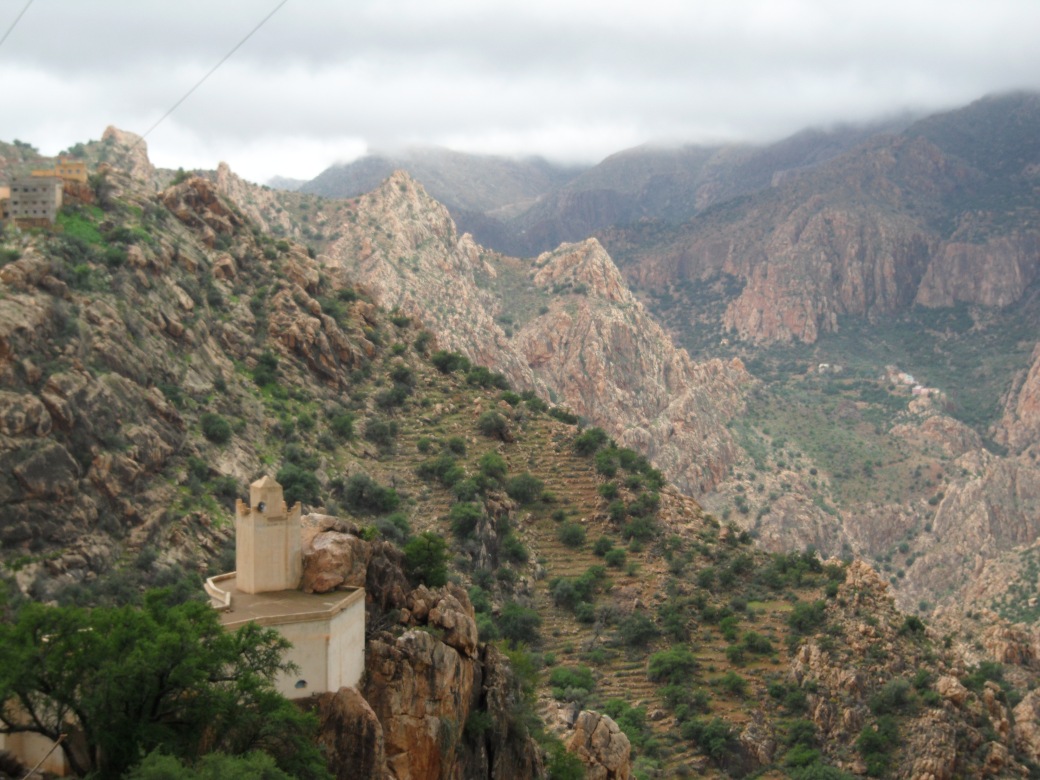
The English speaker departed from the taxi at one of the larger towns we passed through. A woman was to take his place; I gave her my seat in the front so she wouldn’t have to squeeze in the back with the men.
I arrived in Tighmi very late, as I said; we’d had to keep stopping for the men to stretch and urinate and for the woman to vomit into a plastic bag, car-sick from the ribboning mountain road.
I met up with Idris and he and I spent the following days hiking around the donkey paths surrounding his village. He liked pointing out sites of interest from my last visit.
“Remember when I showed you the kasbah with the animals in it? Remember the house of Lallia who gave you the couscous? Here, sit on that rock and give me your camera; I will take a photo of you looking down at the village. No, don’t look at me, look at the village.”
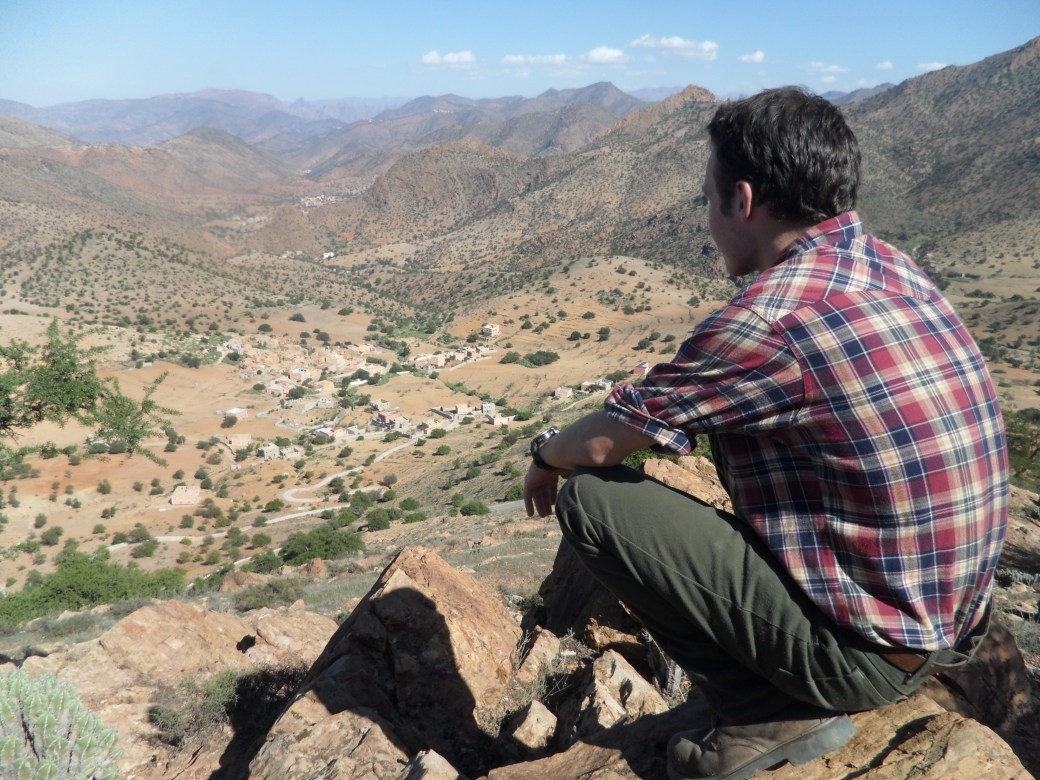
Down in the village, things were perking up. Communities in the Anti-Atlas range, who used to farm wheat but no longer do, are largely, if not entirely, dependent on income from the younger generation who go to the cities in search of work and schooling. And with the festival on, these clean-cut twentysomethings had begun to gravitate back toward their roots.
Idris and I watched them come. They arrived by bus, by foot, by thumb, marching down the hill arm in arm, flashing their white smiles. They walked easy in their traditional robes which they probably never wore in the city. They scattered around the hillsides to sit in the shade of argan trees and smoke cigarettes where they wouldn’t be judged by their parents. Idris rolled his eyes. He and I marched around the hillsides, gathering them up two by two. We greeted each one, shook hands, discussed things I couldn’t understand, and moved on. I learned all their names but forgot most of them. Isa, Mohamed, Lahsane, Umar, Mohamed.
They represented the ghost population of the village. As emigration to the cities has become a necessity for men, it’s naturally become a mark of masculinity. Men don’t stay behind to tend goats with the women anymore; men leave home, make decisions, become self-sufficient, learn a more prestigious language. And get rich.
Indeed success as a migrant seems to be tied to one’s masculine pride. One of the most prestigious (also derided, but always respected) men in the village had lived for years in Italy and come to own a house there; now he’s a bigwig here in the village where he is raising his son. On the other hand, the young men who never made it further than Tiznit or Agadir, and never any higher than bread bakers or luggage-carriers, have their backstories tactfully glossed over as Idris explains them to me. You can picture the life, exaggerating one’s accomplishments when phoning your family, sleeping on the floor in the back room of a newsagent, sending payments home well beyond your means.
No wonder they begin to forget all the faults of their homeland. I’m friends on Facebook with dozens of these city dwellers; in 9 out of 10 cases their profile photos depict themselves standing against a mountainous backdrop of the tamazirt, their native soil. The Berber language, generally looked down on as inferior in cities, is barked loudly and proudly when they meet each other in public. The sensation of hearing the tweedly, flat-note choruses of Berber music playing through the taxi radio as they are borne along breakneck roads toward their homes must be akin to that of a German when he hears the strains of Wagner after a long stint abroad. The semi-annual trip home becomes fairy-tale adventure to look forward to.
The romance was contagious and while I may be mono-lingual and culturally ignorant, I felt the magic in the village that afternoon.
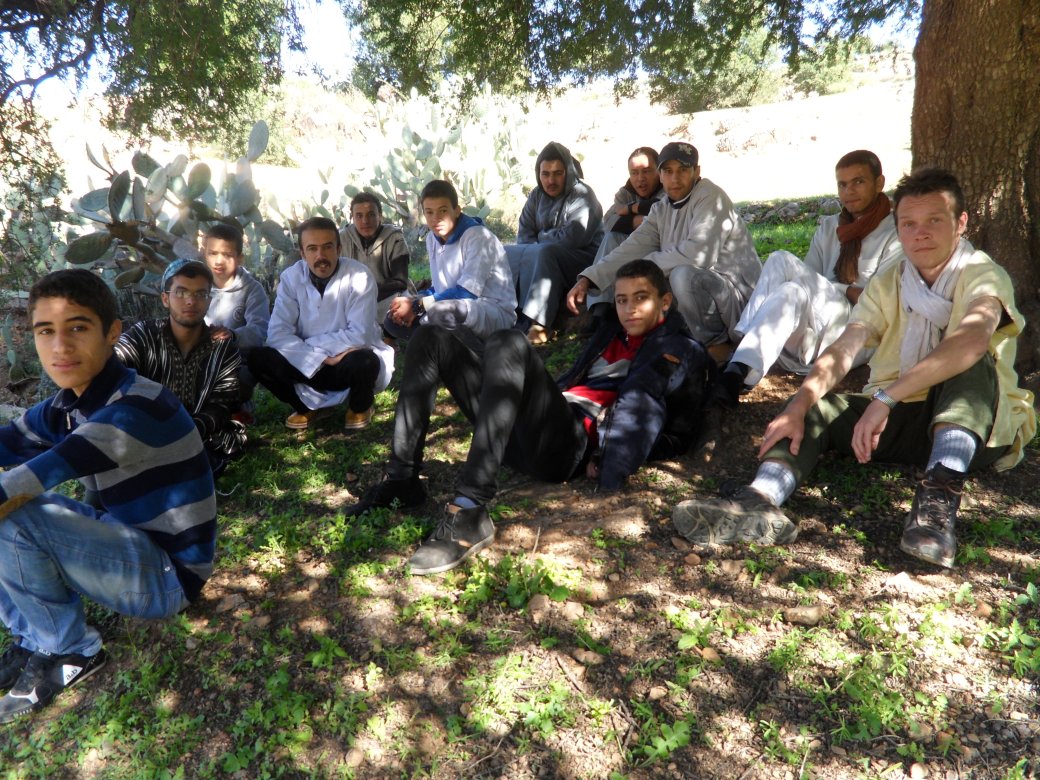
We had all arranged for a hike into the gorge after lunch, except for the smokers, who seized the chance to run off behind some rocks. The younger boys of the village wanted to come with us. I stooped to pick some thyme leaves to save for later. Seeing this, the kids kept me entertained, and in constant pain, by shoving specimens of the thorny plant into my pockets by the handful.
The air of the gorge is cold, and the earth is colored a rich green and red at this time of year. Swallows nest on the sides of the cliffs in furious numbers. We marched down the slope in singe file. The route, like every other in Morocco, was a mere suggestion of a path, scratched out by the feet of generations of sheep and washerwomen.
Once at the bottom we all dispersed into activities such as skipping stones and chasing frogs. I saved the life of a lizard some of the younger boys had been trying to hit with rocks.
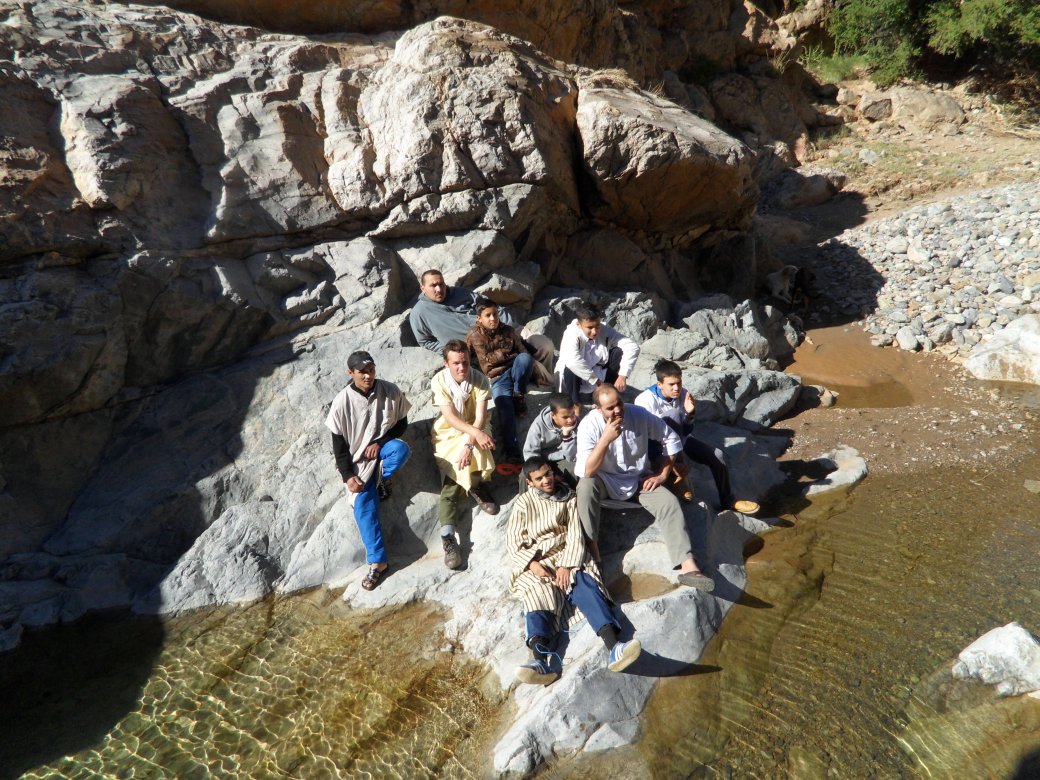
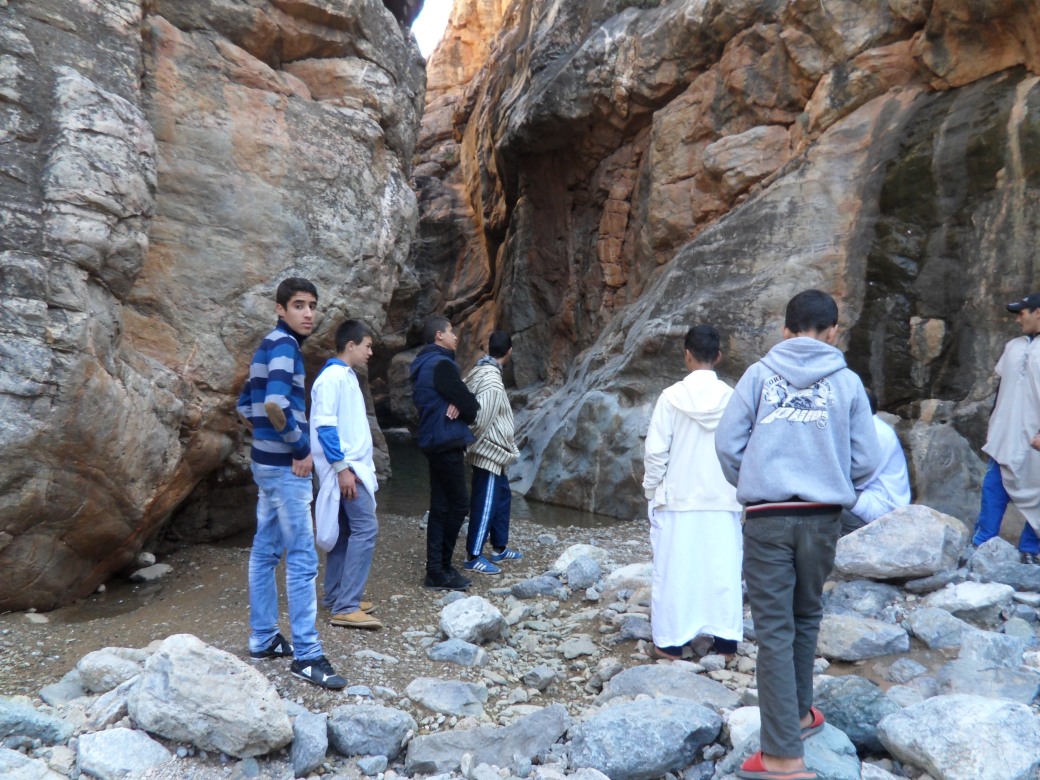
We carried on like this until some airy magnetism brought all of the returnees to crouch together at the edge of a fluted pool. I’d been busy admiring a sunbathing skink, but the slurping and snorting noises coming from behind the rocks told me the time for prayer had arrived. One of them, Isa was already going at it, prostrate on his face in a patch of sun.
I retired with the younger boys, of whom prayer is not expected, to poke at the wet sand with sticks and spectate over some argument about which way was east.
Then the guys all lined up like tin soldiers, a striped array of denim jackets and traditional robes. Isa, who had already finished praying, emerged on top of a spike of rock overshadowing the worshippers. The 4 o’clock sun shone through his robes as they flapped in the wind, and he puffed calmly at a cigarette. Facing one direction, the rest of the guys all fell to their knees.
The younger boys who were exempt from prayer began tugging on my shirt; they wanted to go further downstream to snap some photos.
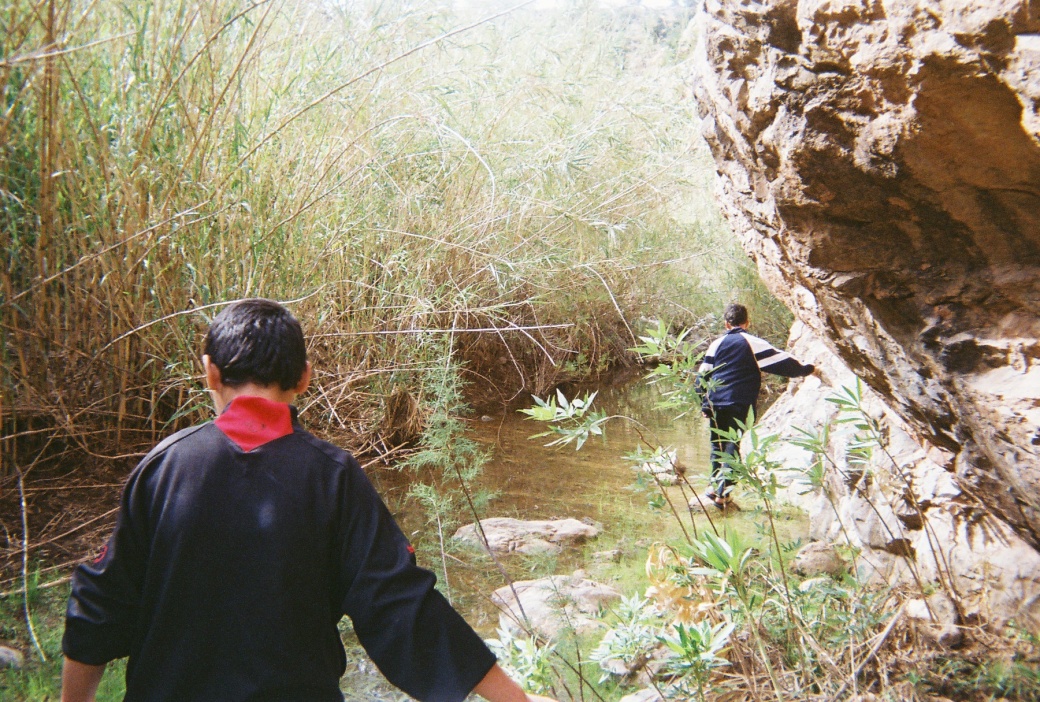
We were splashing about trying to catch frogs when Idris, finished with prayer, came down to us.
“So what do you think?” he said.
“About what?”
“Are you happy?”
“I’d be happy if I could catch this frog.”
Within seconds Idris had the frog in his hands. I remembered how I’d been skeptical when he’d told me that he could kill a rabbit with a rock. This guy might have steeped himself in modern education and classical philosophy, but he was still a native of the mountains.
He regarded the frog with interest, handling it as gently as an egg.